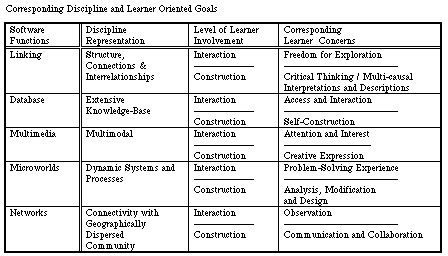3.2 The Focus of Educational Goals
Each successful project's goals were designed to provide mutual benefits for the learner
and the discipline. While educators associated with the projects were deeply concerned
about the quality of the representations they produced, both their goals and their practices
also portrayed a keen awareness and sensitivity to the relationship between the student and
the computer, and the impact of this relationship upon the student. Learner involvement was
precipitated through particular software and courseware characteristics, assignment structure,
or through the process of involving students directly and indirectly in courseware construction.
While stated goals may be useful for communication about a project, or to aid in planning,
they were to some degree independent of the outcomes. The outcomes of courseware projects
resulted from decisions about what type of representations to create, the degree to which
these representations were successfully supported by the chosen or created tools, the role
of the learner afforded by the chosen software, the assignments given by the faculty during
implementation, or arrangements made to create the courseware in cost effective or convenient ways.
In each successful project, neither the learners nor the discipline were slighted, and both
types of goals were addressed through either the same means, or complimentary means.
Consistent attention to the dual set of goals within each of the courseware projects was
probably a major factor in their success. The table below describes the five kinds of
outcomes found across the projects in this study, arranged by how they were described in
both discipline and learner oriented terms. Each of the projects may have chosen to frame
its goals and outcomes in either a discipline or learner oriented framework, or both.
But no matter how the endeavors were described, the directors of the projects were also
aware and interested in the other issues.

Table Corresponding Discipline and Learner Oriented Goals
For any choice in software or implementation, there were both discipline and learner
oriented issues to be discussed. This may be an important, but infrequently expressed
reality behind what has become known as "Constructionism." A common interpretation may be that
"Constructionism" represents a predominant and overriding concern for the learner.
A more accurate representation of "Constructionism" is reflected within Lawler's
portrayal of the central dilemma of education as a concern for "instructing" while respecting
"the self-constructive" character of the mind (Lawler, 1982).
There are important observations to make about this statement, and the ways in which it was
reflected in the courseware projects in this study. The first is that a deep concern for
"instruction" is not absent from this formulation of the central dilemma of education,
as it was not in any of the courseware projects. On the contrary, it was evident that the
"learner oriented" educators were also dedicated to the discipline that they taught.
Educators may be concerned for learners out of purely humanistic motives, or they may
arrive at this concern by way of realizing that in order to effectively communicate the
discipline to which they are dedicated, they must find a way to do so within the constraints
of the "self-constructive" nature of the learners who will carry on that discipline.
In fact, particularly at Athena, it appeared that courseware that did not provide for active
learner involvement in some way, did not succeed.
Educators dedicated to communicating their discipline realized that attempts to "instruct"
without taking the nature of the learner into consideration would ineffective. "Constructivism"
emerged from concern for the effective communication of the discipline, as well as from
humanistic concerns about improving learners problem solving skills or overall enjoyment
of their educational experiences. These concerns are not mutually exclusive, although
a great deal of contemplation was required in order to balance them successfully.
